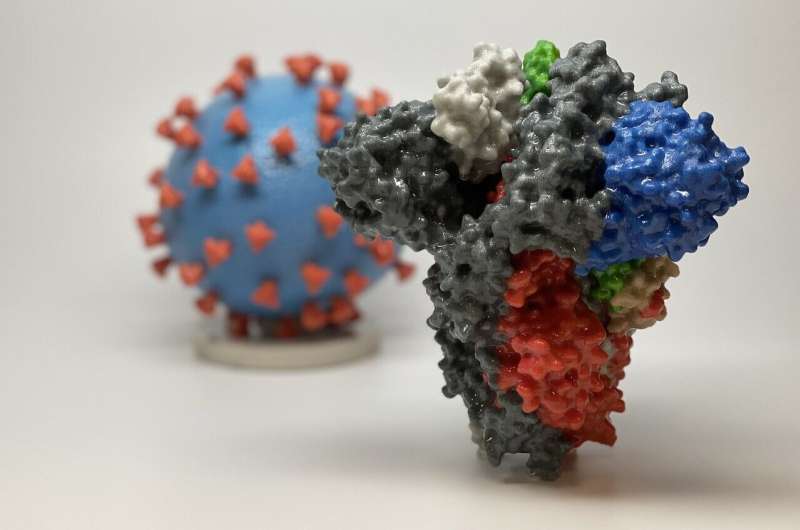3D print of a spike protein of SARS-CoV-2, the virus that causes COVID-19—in front of a 3D print of a SARS-CoV-2 virus particle. The spike protein (foreground) enables the virus to enter and infect human cells. On the virus model, the virus surface (blue) is covered with spike proteins (red) that enable the virus to enter and infect human cells. Credit: NIH
A single dose of the Pfizer vaccine provides "very high" protection from COVID-19 after 21 days—without a 'top up' dose in the recommended time frame, according to a new study from the University of East Anglia.
Researchers looked at data from Israel, where the vaccine has been rolled out.
They found that the Pfizer vaccine becomes 90 percent effective after 21 days—supporting UK plans to delay the timing of a second injection.
But they warn that people's risk of infection doubled in the first eight days after vaccination—possibly because people become less cautious.
Due to the rapid response nature of this research it has not yet been peer reviewed.
Lead researcher and COVID-19 expert Prof Paul Hunter, from UEA's Norwich Medical School, said: "A second dose of the Pfizer vaccine would normally be given 21 days or more after the first to top up and lengthen the effect of the first dose.
"But here in the UK, the decision was made to delay the timing of the second injection until 12 weeks after the first.
"The logic behind this is to protect more people sooner and so reduce the total number of severe infections, hospitalisations, and deaths.
"But this decision caused criticism from some quarters due in part to a belief that a single injection may not give adequate immunity.
"A recent non peer-reviewed pre-print paper based on Israel's experience looked at data from 500,000 people who had been given the Pfizer vaccine. It reported that a single dose may not provide adequate protection.
"But we saw a number of flaws in how they looked at the data including the fact that they did not attempt to estimate the effectiveness of the vaccine from day 18 onwards. This would have given a better indication of how effective a single dose of the vaccine could be if the second dose was delayed by up to 12 weeks."
The research team set out to estimate the effectiveness of the Pfizer vaccine after a single dose—by reanalysing real-world outcomes from Israel.
They used the data to see how the Israeli vaccination programme impacted case numbers, and went on to estimate vaccine effectiveness over time.
They found that after the initial vaccination—case numbers increased for eight days before declining to low levels by day 21.
Prof Hunter said: "Surprisingly, the daily incidence of cases increased strongly after vaccination till about day eight—approximately doubling. We don't know why there was this initial surge in infection risk but it may be related to people being less cautious about maintaining protective behaviours as soon as they have the injection.
"We found that the vaccine effectiveness was still pretty much zero until about 14 days after people were vaccinated. But then after day 14 immunity rose gradually day by day to about 90 percent at day 21 and then didn't improve any further. All the observed improvement was before any second injection.
"This shows that a single dose of vaccine is highly protective, although it can take up to 21 days to achieve this.
"And it supports the UK policy of extending the gap between doses by showing that a single dose can give a high level of protection.
"Whilst we do not know how long this immunity will last beyond 21 days without a second booster, we are unlikely to see any major decline during the following nine weeks," he added.
Prof Hunter and Dr. Brainard were funded by the National Institute for Health Research Health Protection Research Unit (NIHR HPRU) in Emergency Preparedness and Response at King's College London in partnership with Public Health England (PHE) in collaboration with the University of East Anglia.
"Estimating the effectiveness of the Pfizer COVID-19 BNT162b2 vaccine after a single dose. A reanalysis of a study of 'real-world' vaccination outcomes from Israel" is published on the medRxiv pre-print server: www.medrxiv.org/content/10.110 … 021.02.01.21250957v1
More information: Estimating the effectiveness of the Pfizer COVID-19 BNT162b2 vaccine after a single dose. A reanalysis of a study of 'real-world' vaccination outcomes from Israel, doi.org/10.1101/2021.02.01.21250957 , www.medrxiv.org/content/10.110 … 021.02.01.21250957v1
Provided by University of East Anglia
























